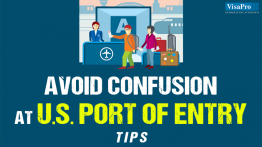Introduction
Overstaying authorized period of stay in the U.S. (commonly referred to as “Overstaying Visa” or “Visa Overstay”) is no longer overlooked and can result in very serious consequences.
Generally, an individual’s authorized period of stay in the U.S. is determined by the date issued by a Customs Border Protection officer on the I-94 record on entry into the U.S., or the date the individual’s status expires as determined by USCIS on a Change of Status or Extension of Status application.
Consequences of Overstaying A Visa In USA
The issue of overstaying a visa in the U.S. while on a nonimmigrant visa has been receiving serious attention in recent years. Some of the consequences of overstaying your visa status are:
- Visa overstays may be barred from returning to the U.S. for ten years or three years depending on the period of overstay or “unlawful presence”.
- Visa overstays may be restricted from applying for Extension of Stay or Change of Status.
- Visa overstays will have their existing visa automatically revoked or cancelled.
- Visa overstays are generally unable to obtain a new visa except in their country of nationality.
- Visa overstays may not be able to Adjust Status in the U.S. even if otherwise eligible.
The consequences and penalties for overstaying your visa in USA may be considered as below:
1. Inadmissibility As A Consequence of Overstaying Visa
Overstaying the period of authorized stay may result in the accrual of “unlawful presence.” After accruing sufficient unlawful presence, you may be barred from re-entering the U.S. for up to 10 years.
a.The Three Year Bar: Persons who overstay in USA for more than 180 days but less than one year after their authorized period of stay has expired, and who leave the U.S. prior to the institution of removal proceedings, are barred from reentering the U.S. for three years from their date of departure.
b.The Ten Year Bar: Persons who overstay in the U.S. for more than one year after their authorized period of stay has expired, and who leave the U.S. prior to the institution of removal proceedings, are barred from reentering the U.S. for ten years from their date of departure.

2. Bar To Change Status And Extend Stay As A Consequence of Overstaying Visa
Persons who remain in the US after their authorized period of stay are generally not able to extend their stay in the U.S. or change their status to another nonimmigrant status.
In most cases they are also barred from adjusting their status from nonimmigrant to immigrant.
DID YOU KNOW
As long as a foreign national files a nonfrivolous application for an Extension of Stay or Change of Status or Adjustment of Status before the period of authorized stay expires, the foreign national will be considered to be maintaining status until a decision is made on the application or petition, even if the decision is made after the date on the I-94 expires.
3. Visa Voidance As A Consequence of Overstaying Visa
When a foreign national overstays their authorized period of stay, the visa stamped in the passport by the U.S. Consulate is automatically voided. U.S. immigration laws are very strict in its interpretation and application of this provision – overstaying in the U.S. by even a day will void your existing visa.
IMPORTANT
A foreign national who has overstayed visa may not be readmitted unless they have obtained a new nonimmigrant visa in their country of nationality.
4. No Consulate Shopping As A Consequence of Overstaying Visa
Any foreign national who has stayed beyond his period of authorized stay in the U.S. must return to his country of nationality to obtain a new visa. You may no longer apply at a Consulate that is ‘more convenient’ or closer to the US.
There is a narrow exception to this rule. If the foreign national can show that ‘extraordinary circumstances’ exist, they may be allowed to apply for a visa at a Consulate in a third country, i.e., a country that is not their country of nationality. Any person wanting to take advantage of the ‘extraordinary circumstances’ exception must receive the consent of the third country Consulate before making an appointment and submitting a nonimmigrant visa application.
DID YOU KNOW
If there is no Consulate in your home country of nationality which issues visas, the Secretary of State has designated a third country where those individuals can apply for a new visa.
3 or 10 Year Bar of Inadmissibility: Waiver For Overstaying Visa
1. Visa Overstay Waiver For Nonimmigrants
The regulations do not include a specific waiver of the three or ten year bar for nonimmigrant visa applicants.
The immigration regulations do not, however, preclude a nonimmigrant from applying for a general waiver under section 212(d)(3).
Section 212(d)(3) makes available to nonimmigrants a general waiver for most grounds of inadmissibility.
2. Visa Overstay Waiver For Immigrants
The regulations provide a specific waiver for the three or ten year bar for foreign nationals who are the spouse, son or daughter of a US citizen or permanent resident.
The visa overstay waiver is not available to foreign nationals who only have children who are US citizens or permanent residents.
To obtain the waiver for overstaying visa, the foreign national must show that their US citizen or permanent resident spouse or parents will suffer ‘extreme hardship’ if the foreign national is not allowed to return to the US. ‘Extreme hardship’ to the foreign national himself is not recognized for the purposes of the waiver.
How To Avoid Overstaying In USA
1. Check The Expiration Date On Your I-94
You must leave the U.S. on or before the expiry of the authorized period of stay granted at admission or with any subsequent Extension of Stay or Change of Status, unless you file a timely, non-frivolous application for Extension of Stay, Change of Status, or Adjustment of Status.
Those entering the U.S. by air or sea should obtain their automated I-94 information online. Those who enter the U.S. by land are given a white I-94 Arrival/Departure Record card.
2. Make Sure To Document Your Departure
Get your passport stamped when you enter another country, save your airline tickets & boarding pass, and save your travel itinerary.
Conclusion
The consequences of overstaying visa in USA are numerous and harsh; from having to securing a new visa to return, to facing up to a 10 year bar from reentering the country.
If you have overstayed visa in the U.S., or have any questions on the penalty for overstaying visa and its impact on your future travel to the U.S. consult a VisaPro immigration attorney. Our experienced attorneys will navigate you through the exact steps necessary to straighten your immigration situation.
What VisaPro Customers Are Saying
The US [B-1] Visa has always been a tough ride, and being denied a few times it makes it even worse. But thanks to VisaPro and their meticulous processing I was granted a Visa. I would like to thank you and all the people involved in making this a success. I would like to recommend VisaPro to all those who seek peace of mind and hassle free Visa processing.”
 Manas Bhat, Director Operations, First Houston Mortgage India
Manas Bhat, Director Operations, First Houston Mortgage India



